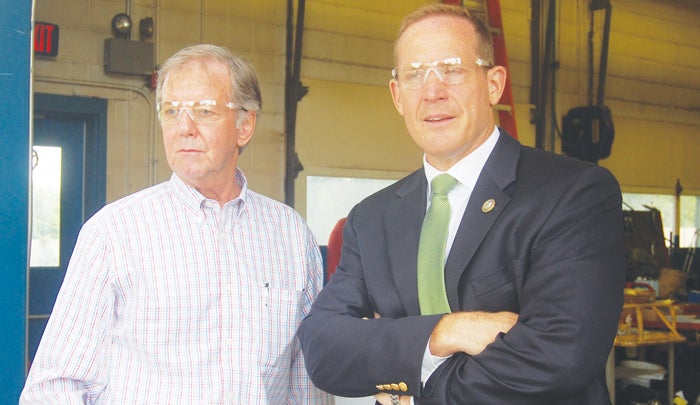Rep. Ted Budd hears concerns from local business leaders
Published 12:00 am Tuesday, July 3, 2018

- Dyke Messinger, president of Power Curbers, and U.S. Rep. Ted Budd, R-13, survey a completed machine outside of the factory on Monday. Andie Foley/Salisbury Post
SALISBURY — U.S. Rep. Ted Budd and representatives of the National Association of Manufacturers visited Power Curbers on Monday for a tour and a roundtable with business leaders.
The roundtable featured community leaders discussing the real-world impact of tax reform and other ways Congress can better serve the interests of North Carolina manufacturers and manufacturing workers.
Dyke Messinger, president of Power Curbers, began the discussion by offering praise for Budd’s effort to pass tax reform.
“It’s going to do good things for our country, for these guys out here in our plant,” Messinger said. “They won’t be able to connect it today, but it will be connected in the future.”
Josh Ward of the National Association of Manufacturers agreed.
“Congressman Budd, in this Congress, sports a 100 percent voting record with the National Association of Manufacturers,” Ward said. “So if there’s going to be an advocate for manufacturing, somebody that understands what manufacturers need, it’s Congressman Budd.”
But Messinger said he has a real concern about what he called “the tariff situation.”
“At this moment in time, construction machinery has not been hit with the tariffs,” he said. “But the way this thing is playing out, it’s going to cover lots of stuff.”
He said he and other manufacturers have been big supporters of President Donald Trump but they don’t support tariffs because the have the potential to reverse all the gains brought by tax reform.
Budd said that current tariffs are meant only as an effort to lead to trade reciprocity.
“We don’t want a tariff war. We don’t want a trade war,” said Budd. “But, short-term, we’re willing to have these fights while the economy is strong so that in the midterm, we can eliminate tariffs.”
The goal is for more trade, not less, he said.
Others involved in the discussion spoke of another pressing concern for the manufacturing industry: a shortage of qualified workers with a high school degree who can pass a drug test and who are willing to show up every day ready to work, said Messinger.
Craig Lamb, who oversees the North Carolina Manufacturing Institute at Rowan-Cabarrus Community College, said employers often mischaracterize this as a skills shortage.
While there are skills shortage issues, he said, there’s also a labor shortage.
Lamb suggested greater incentives for technical and skilled courses of study.
“This will work only if we’ve got people flowing through it,” he said.
Budd said the skills shortage and labor shortage problem is twofold. For skills, the problem is education inflation: an overabundance of people with four-year degrees when what’s needed are people with certificates or two-year degrees, he said.
He said the labor shortage is a “new problem we’ve created with the growing economy” because there are 6.7 million unfilled jobs.
Meanwhile, he said, there are 6.3 million people disengaged from the workforce.
As a possible solution, Budd offered up work requirements to get certain government benefits. He cited the recent farm bill and proposed work requirements for the Supplemental Nutrition Assistance Program.
The idea is for able-bodied adults without dependent children to have to work to receive these benefits, he said, which “establishes good habits.”
Other concerns raised during the session ranged from the need for manufacturing “predictability” — a concern brought by Denise Hallett of Vulcan Materials Co. — and the need for “reasonable, smart immigration” to fill the labor shortage, brought by Fletcher Steele of Pine Hall Brick Co.
Rowan County commissioners Chairman Greg Edds also brought up the need for infrastructure funding. Budd said he recently co-sponsored legislation to help address the issue.
The bill would use $50 billion in distressed U.S. Department of Agriculture assets, half for deficit reduction and half for poor neighborhoods in need of infrastructure improvements.
“There might be pockets of Rowan County that, if this would pass, that could apply to,” said Budd.




